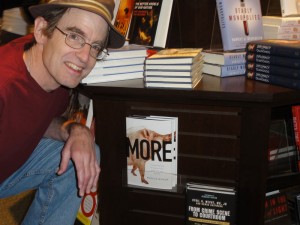Bishop analyzes how much of an impact the media truly have on us all and discusses our obsession with it. Nothing is ever enough in today’s society. The media stress that it isn’t enough to strive and work hard for the best things — you either have to have it all, or all your efforts won’t amount to anything.
In “More,” Bishop clarifies his argument that activities are not done in a casual manner. “By ‘casually,’ I mean in a relaxed fashion, for the fun of something, for the joy of something — not to try and accomplish anything other than enjoyment and edification — yours and your neighbors.” It is insufficient for a person to have the fastest, fanciest car on the block. Nowadays, for it to be worth anything, one must have three luxury vehicles.
Nowadays, Bishop argues, everything has to be elevated to a grand scale for it to matter at all, from astronomical food portions served at restaurants to the number of children a couple decides to have. This can be seen in many of the so called “reality” television shows that many Americans are obsessed with. The main example of how even childbirth has to be on a grandiose scale is the story of Nadia Suleman, better known as the “Octomom.” Bishop goes into great detail speaking of how many kids she wanted and that tragically, it all seemed to be for fame instead of the love of her children.
Fortunately, the inspiration Bishop received from Drexel while writing was wholly positive. “The main Drexel-related influence,” Bishop said, “is the freedom I have as a researcher/scholar to pursue topics that interest me. They tend to fall in one of a few areas, but [Dean Donna Murasko of the College of Arts and Sciences] has always given me the sense that I could go where my curiosity took me. That’s not the case in all disciplines and in all universities. Most folks have a predetermined research plan.”
Bishop’s curiosity led him to use many familiar examples from modern society that readers can relate to. He also uses many clever personal anecdotes to help get his point across the central idea being that this notion of bigger being better needs to be forgotten if Americans want to be able to enjoy their lives.
Overall, the way Bishop depicts the whole issue throughout “More” is scarily accurate. As Americans, we have grown so used to constant media pressure and stress that we no longer realize how much control it has over our everyday lives. It has been engrained into our thinking that better, bigger and faster are the only ways to live our lives.
Social media outlets play such a major role in our society that as soon as something momentous happens, we immediately have to update our social media sites to let everyone know. It is as if we are in constant competition with each other. We now only do things in order to brag about them so that it no longer appears that we lead a boring life.
“More” clearly exemplifies common everyday behavior that we no longer notice. Bishop mentions students and their attachment to personal electronic devices. Instead of punishing them as many professors would, Bishop will engage his students in conversation by asking them to look up something on their phones that is relevant to class discussion. That’s a proper way to engage the students and stay updated with the times instead of resisting them.
“More” is a very engaging, thought-provoking book that will cause readers to rethink their actions and analyze the way they do things throughout their daily routine. Readers will begin to question if they are performing a task for the simple joy and pleasure of the activity, or if they are doing it to secretly compete with their peers. Hopefully this book will raise awareness on how greedy and selfish humans are in today’s society, and that will lead to some sort of change for the better. This commentary is for anyone who enjoys a thoughtful read with a really powerful message underneath it all.
When asked about readers’ reactions to the book, Bishop responded: “What shocked me — and pleased me — is that I’ve gotten positive reactions from folks from all points on the ideological spectrum. My first few media interviews were with folks who were on the right, and, later, some that might be perceived to be a bit left of center. I was a little worried, though, that they thought I was indicting the media or indicting the folks [on] whose behavior the dominant narrative is based. I didn’t want the reaction to a book [about] lack of scale to lack scale.”
Bishop is very accomplished in the world of writing. He was a journalist and newspaper editor and has also written several books, including “When Play Was Play: Why Pick-Up Games Matter” and “Taking on the Pledge of Allegiance: The News Media and Michael Newdow’s Constitutional Challenge.”
Bishop is currently working on a book with Drexel students Renee Daggett and Alissa Falcone. He lets on that the book will be about how “community newspapers covered the construction of the Japanese-American internment camps after the attack on Pearl Harbor.” Bishop boasts that “Actually, [Daggett and Falcone have] done most of the work — Renee and I presented our work at a journalism history conference last March in NYC — and I’m hoping Alissa and I will present at the same conference next March”. Be on the lookout for their new book.



